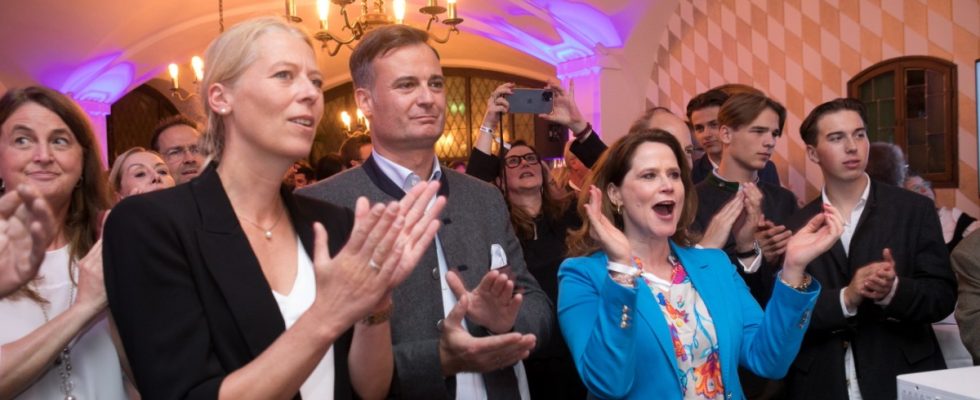It’s just a word, but this little word reveals something about the CSU’s expectations for this state election in Bavaria. The CSU has announced an “election party,” which is what parties do when an election is coming up. And yet, you stumble over the word, two years ago the announcement was different. Before the 2021 federal election, the CSU did not even invite people to the “election party”, but rather to the “election evening”, quite soberly. Everyone could have guessed that there was nothing to celebrate. And that’s how it happened. The faces were long, the evening was short.
No, this time too hardly anyone in the CSU expected a lavish party. But a tiny little party? At least one thing is certain at 6 p.m., in the conference room of the state parliament, where the CSU has invited: The 37 percent of the first ARD forecast is slightly better than the party’s surveys had predicted for weeks. Just in time for the election, the “fever curve of solidarity” that CSU leader Markus Söder measured for the Free Voters after the leaflet affair involving their chairman Hubert Aiwanger appears to have subsided.
The FW survey curve had risen to 17 percent at times, but in the first ARD forecast on election Sunday it was only 14. The CSU, on the other hand, was at 6 p.m. roughly at the result it achieved in 2018. It was 37.2 percent, the worst result since 1950. But that is the first realization on the recent election evening: It could have been even worse for the Christian Socialists. At the CSU election party there is applause for their own results, nothing more. There is cheering when the three percent for the FDP lights up – and then the CDU’s good election result in Hesse.
Anyone who still needed help making a decision was given a final helping hand by Markus Söder on Friday evening, at the CSU election campaign closing ceremony in Munich’s Löwenbräukeller. There he once again made the CSU attractive to those who were toying with the Free Voters. “We are the bratwurst and they are the cabbage,” said Söder. Calling yourself a sausage could be considered brave. But at 6 p.m. there is actually a little more sausage and less cabbage on Bayern’s plate than was previously expected.
CSU Agriculture Minister Michaela Kaniber called the 37 percent “a strong sign” on Bavarian television shortly after 6 p.m. Especially since “special effects such as a leaflet affair were not predictable”. “The commitment of the electorate was clear tonight,” said Kaniber. The CSU now wants to continue the coalition with the FW.
An additional percentage point could have ultimately given the CSU the weakness of the FDP. The surveys recently predicted only three percent. Fatal for the Liberals, who had to fear that their few remaining supporters would have doubts about whether they wanted to give their vote to a party that would almost certainly be thrown out of the state parliament. “It makes no sense, it won’t get in,” said Söder about the FDP at the end of the election campaign – in the hope of picking up the votes of the doubters.
“In the end, it depends on the Prime Minister,” Markus Söder had said something like this again and again in the past few weeks – which gave the CSU chairman some leeway to shift the responsibility for a possible election defeat somewhere other than himself. And the fact that he early on called the Bavarian state election an “election of fate” could be attributed both to the CSU and to him personally.
And what could 37 percent mean for the question of whether Söder can run again in the race for the Union’s candidacy for chancellor? Before the election, the starting position seemed clear. If the CSU remained below the 37.2 percent in the 2018 Bavaria election, that was the general assessment, his chances of becoming chancellor would be pretty much gone. If he were to increase the result, perhaps even significantly, his chances would have increased accordingly. Early on Sunday evening it looked as if the CSU would roughly maintain its result. This means that Söder could at least stay in the game when it comes to the candidate for chancellor.
Söder recently denied that he wanted to become a candidate for chancellor. What was he supposed to say in the middle of the Bayern election campaign? That people should please vote for him, but only for two years, because then he will fly off to Berlin? It will be more interesting to see how Söder will answer all the Chancellor’s questions once a few months have passed after his fateful election in Bavaria.
On Friday, in the Löwenbräukeller, two days before this election, Söder looked further ahead: “We have to send this traffic light into the desert in 2025!” The fact that the desert sounded a bit like the name of a man who also belongs to the group of candidates for chancellor and was sitting in the audience as a guest of honor was not intentional. And no one has to take the fact that Söder calls this man, NRW Prime Minister Hendrik Wüst (CDU), a friend too seriously.
Söder doesn’t have to fear a vote of no confidence in his own party. The election result shouldn’t be bad enough for that. And not even the biggest Söder skeptics in the CSU hold him liable for the tricky circumstances, especially after the Aiwanger affair. The question that still remains is what Söder has to fear after the election of Aiwanger, who made it very clear in the poll frenzy that his party would like to have more power in the future in a coalition with the CSU. The election campaign may be over now. The power struggle between Markus Söder and Hubert Aiwanger could only really begin.

